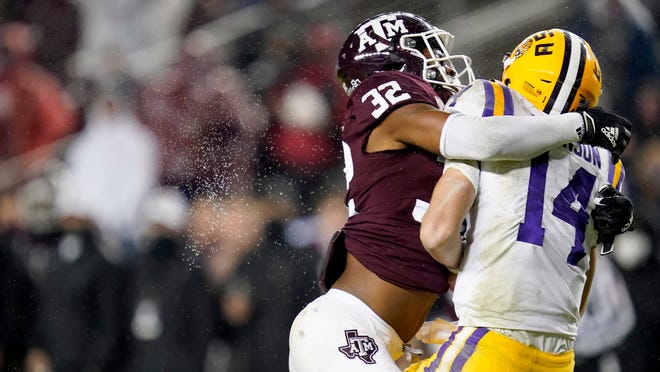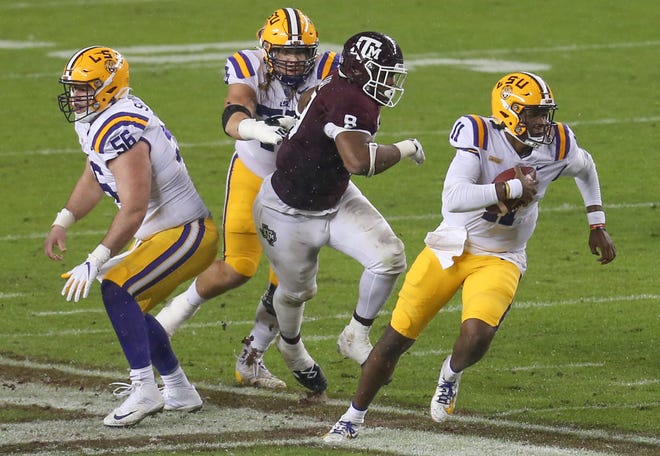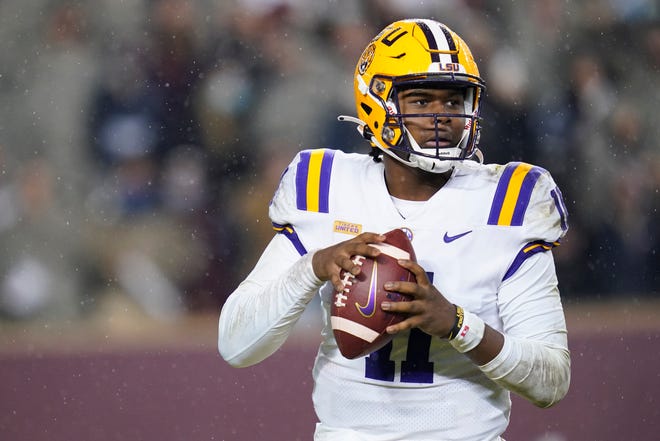LSU vs. Alabama: 'We have to come together with a better plan,' says LSU guard Ed Ingram
 Glenn Guilbeau
Glenn Guilbeau
BATON ROUGE - If LSU's floundering offense is to have a chance against No. 1 Alabama in Tiger Stadium, it at least needs to be the only side to know the play.
That was often not the case in the Tigers' 20-7 loss at Texas A&M last week.
At times, LSU's offensive linemen must have felt like opponents of the 2017 and '18 Houston Astros, who were found to be cheating in an illicit sign-stealing conspiracy. Only the Aggies were not stealing signals. They broke their tendencies on defense, which confused LSU, and they learned LSU's calls throughout the game, which further exasperated the Tigers.
"That's exactly what happened," left guard Ed Ingram said this week. "We anticipated something else going on on third downs, but they ended up changing what we originally thought was the plan for that game."

LSU was held to its lowest point output since a 29-0 loss to Alabama in 2018 and managed just 36 rushing yards on 25 carries, 267 total yards and a season-low 14 first downs. The Aggies collected three sacks and intercepted quarterback TJ Finley twice as LSU continually slid its pass protections one way, and the Aggies came from the other.
"They started reading our calls and changing their defense on our calls, so they were reading our signals," Ingram said. "They were switching their defense to whatever we were doing. So, that's pretty much what was happening on third downs."
Alabama (8-0) is No. 4 in the Southeastern Conference and No. 36 nationally in total yards allowed a game at 357 yards. LSU (3-4) is No. 4 in the SEC and No. 44 nationally in total offense with 425 yards a game. The Tide is a 28-point favorite, according to BetMGM.
"This is a copycat league, so it could show up again," Ingram said. "So the plan going into this next game is to combat that and correct the protections and make better calls."
LSU offensive coordinator Steve Ensminger, passing game coordinator Scott Linehan and offensive line coach James Cregg were unable to adjust to A&M defensive coordinator Mike Elko's strategy attack effectively until late in the game. The Tigers drove 81 yards in 14 plays in the final minutes for their touchdown with 38 seconds left behind backup quarterback Max Johnson, who replaced Finley.
Finley is expected to start Saturday (7 p.m., CBS) and both will play, LSU coach Ed Orgeron said.
"They were both running for their life all night. I can't blame them," Orgeron said.
"They typically brought pressure from one side," center Liam Shanahan said of LSU's film study. "So we would slide to that side. They figured it out and started coming from the other way. That's what happened."

Shanahan brought this to the sidelines.
"What I try to do is get with Coach Cregg immediately and communicate with him what I'm seeing up front and what they doing," he said. "And we try to come up with a plan of what we need to do."
That did not work for almost the entire game. "It got frustrating definitely," Shanahan said. "We weren't ever really able to get into a rhythm throughout the whole game."
The problems covered more than pass protection.
"We struggled to get the running game going," Shanahan said. "They ended up breaking their tendencies, which was why we saw some guys running free, especially earlier in the game. By the time, we made the adjustment, it was a little too little too late."
A better game plan for Alabama, Orgeron said, would mean fewer adjustments on the fly.
"No. 1, the scheme has to be better," he said. "We need to put our players in better positions, call better plays, have answers to their blitzes. Too many free blitzes hitting our young quarterbacks. We did not control their front or blitzes. Our execution has to be better on run blocking."
Ingram could not agree more.
"We were all trying to make the correct calls on the blitzes, they were bringing," he said. "But the players and the coaches, we all have to come together with a better plan going into this next game with Alabama."